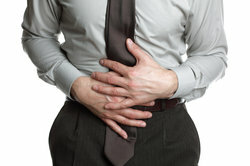What happens in the body when diarrhea occurs?
Do you know that? There is pinch and tweak in the intestine, maybe even downright cramps and suddenly you need a toilet as quickly as possible because you can no longer hold the diarrhea. You have to walk again and again at short intervals, as your body has the urge to completely empty the bowel. What is happening in the body now, you may be wondering.

Causes of diarrhea
- Most people already had diarrhea. It is very likely that you have already been affected. In general, however, it disappears on its own after a day of bland diet. Still, you're probably wondering what's in yours body has happened.
- If your bowel infection is the cause, you will likely complain of runny and frequent stools. Various pathogens are now active that affect your intestines in different ways. In this way, they can destroy the intestinal mucosa, but this can also result in increased excretion of water.
- But it is also possible that you have eaten food that was spoiled. In the case of so-called food poisoning, it is often not the bacteria but their metabolic products that are toxic to our organism and cause the stool to liquefy.
- Diarrhea is not always harmful, but often an attempt by the body to get rid of the harmful substances as quickly as possible. However, this can be dangerous under certain circumstances, namely when the loss of fluid becomes too great. Therefore, adequate hydration is the most important goal of therapy.
What happens in the body
- Your intestines essentially have the task of extracting the nutrients from the pre-digested food pulp and thickening the feces. While the nutrients are being absorbed in the small intestine, the feces thicken in the large intestine by removing water.
- The structures of the mucous membrane of the small intestine are particularly fine. Different indentations and protuberances of different sizes result in one enormous surface enlargement, whereby as many vitamins and minerals as possible are absorbed can.
- If you get an inflammation of the mucous membrane due to a pathogen, the sensitive structure is quickly damaged. Nutrients can no longer be properly absorbed. In addition, the cells now secrete more mucus, which liquefies the stool.
- But it is also possible that you have ingested a substance that causes water to be sucked from the tissue into the intestine. Various laxatives make use of this, but heavy consumption of sweeteners can also lead to it.
- If you suffer from an overactive thyroid, the muscles in your intestines are particularly active. The passage through your intestines is then too fast, leaving your body with insufficient time to thicken your bowel movements. This form of diarrhea is also possible with irritable bowel syndrome.
A gastrointestinal flu with diarrhea, abdominal cramps and often vomiting can ...
How helpful do you find this article?
The content of the pages of www.helpster.de was created with the greatest care and to the best of our knowledge and belief. However, no guarantee can be given for the correctness and completeness. For this reason, any liability for possible damage in connection with the use of the information offered is excluded. Information and articles must under no circumstances be viewed as a substitute for professional advice and / or treatment by trained and recognized doctors. The content of www.helpster.de cannot and must not be used to make independent diagnoses or to start treatments.



